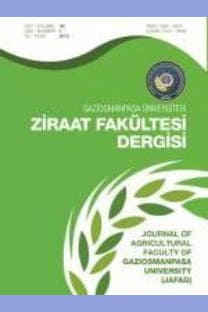Sıraya Gübre Atan Değişken Oranlı Makinenin Geliştirilmesi ve Performansının Belirlenmesi
Artan karlılık ve çevre kirliliğinin azaltılması, değişken oranlı uygulamayı kaçınılmaz kılmaktadır. Bu nedenle, tarla gereksinimine göre gübreleme ve hareket halindeyken gübre oranlarını değiştirme kabiliyeti sahaya özel araçlarından biri olarak kabul edilmektedir. Değişken oranlı makinalar daha karmaşık yapıda olduklarından çiftçiler, ekstra bileşenlerin ve sistemlerin ne kadar güvenilir olduğunu ve getirdiği ek maliyet ve zorlukları göz önünde bulundurmalıdır. Bu çalışma, sıraya gübre atma makinasına modifiye edilmiş değişken oranlı bir granül gübre sistemini ve performansını tanıtmaktadır. Gübre atma makinasının performansını değerlendirmek için, enterpolasyon doğruluğu ve güvenilir değişken oranlı bir gübreleme sistemi elde etmek için parametreler olarak, gübre değişkenlik katsayısı ve tepki süresi, dikkate alınmıştır. Sonuçlara göre, enterpolasyon doğruluğu 0,94 (R2) olarak belirlenmiştir. Tepki süreleri, en düşük gübre miktarından en yüksek miktara ve en yüksekden en düşük miktara geçiş oranları 1ms-1 ilerleme hızında sırasıyla 4,44 ve 4,63s olarak hesaplanmıştır. Gübre oranlarındaki değişim katsayısı, %6,44 ile %26,25 ve 10,45 ile 81,3 arasında değişmiştir. Değişken gübre atma ünitesinin gübre oranı değişkenlik katsayısının (CV) değişimi, sırasıyla geçiş sırasındaki artan ve azalan değerlerde sırasıyla %10,11 ila 36,15 ve %11,15 arasında 117,89 gerçekleşmiştir.
Development of a Row Type Variable Rate Fertilizer Machine and Performance Assessment
Increasing profitability associated with reduction of environmental pollution and production costs madevariable rate application unavoidable. Therefore, fertilizing according to the field demand and ability to varyfertilizer rates on-the-go is regarded as one of the site-specific management tools. Variable rate applicationmachines tend to be more complicated and thus farmers must take into account how reliable the extra componentsand systems. This study introduces a frugal variable rate granular fertilizer with features of and simplicity that wasmodified on a row fertilizer machine. Interpolation accuracy, coefficient of variation and response time asparameters to achieve a reliable variable rate fertilizing system were considered in order to evaluate the fertilizerapplicator performance. According to the results, when interpolation accuracy was determined as R2, 0,94 theresponse times of low to high and high to low transition rate orders were estimated as 4,44s and 4,63s taking intoaccount operation speed at 1 ms-1, respectively. Coefficient of variation of fertilizer rates ranged from 6,44 to26,25% and 10,45 to 81,3 for application rate from 0 to 150 kg/ha. Variation of fertilizer rate among the meteringunits in terms of coefficient of variation (CV) resulted from 10,11 to 36,15% and 11,15 to 117,89% in increasingand decreasing transition order, respectively.
___
- Antolini, L. S., Scare, R. f. and Dias, A. 2015. Adoption of precision agriculture technologies by farmers: a systematic literature review and proposition of an integrated conceptual framework. IFAMA World Conference, USA.
- Azpurua, M. A., & Ramos, K. D. (2010). A comparison of spatial interpolation methods for estimation of average electromagnetic field magnitude. Progress In Electromagnetics Research M, 14, 135-145.
- Akdemir, B., Aydoğdu, B., Üngör, M,G., Atık, M and Sağlam N. (2018). Variable Rate Fertilizer Control System for Centrifugal Fertilizer Spreaders. Journal of Agricultural Faculty of Gaziosmanpasa University. 35 (3):319-329.
- Chi, T. T. N., & Yamada, R. (2002). Factors affecting farmers’ adoption of technologies in farming system: A case study in Omon district, Can Tho province, Mekong Delta. Omonrice, 10, 94-100.
- Ess, D. R., Morgan, M. T., & Parsons, S. D. 2001. Implementing site-specific management: map-versus sensor-based variable rate application. Pub. No. SSM2-W, Site-Specific Management Center, Purdue University, West Lafayette, IN.
- Forouzanmehr, E., Loghavi, M. (2012). Design, development and field evaluation of a map-based variable rate granular fertilizer application control system. Agricultural Engineering International: CIGR Journal, 14(4), 255-261.
- Han, Jun; Morag, Claudio (1995). "The influence of the sigmoid function parameters on the speed of backpropagation learning". In Mira, José; Sandoval, Francisco.From Natural to Artifical Neaural Computation pp.195-201.
- Hu, J. (1995, May). Methods of generating surfaces in environmental GIS applications. In 1995 ESRI User Conference Proceedings.
- Jochinke, D. C., Noonon, B. J., Wachsmann, N. G., & Norton, R. M. 2007. The adoption of precision agriculture in an Australian broadacre cropping system—Challenges and opportunities. Field Crops Research, 104(1), 68-76.
- Kim, Y. J., Kim, H. J., Ryu, K. H., & Rhee, J. Y. (2008). Fertiliser application performance of a variable-rate pneumatic granular applicator for rice production. Biosystems engineering, 100(4), 498-510.
- Motulsky, H., & Christopoulos, A. 2004. Fitting models to biological data using linear and nonlinear regression: a practical guide to curve fitting. Oxford University Press.
- Pierpaoli, E., Carli, G., Pignatti, E., & Canavari, M. (2013). Drivers of Precision Agriculture Technologies Adoption: A Literature Review. Procedia Technology,8, 61-69.
- Robertson, M. J., Llewellyn, R. S., Mandel, R., Lawes, R., Bramley, R. G. V., Swift, L., ... & O’Callaghan, C. 2012. Adoption of variable rate fertiliser application in the Australian grains industry: status, issues and prospects. Precision Agriculture, 13(2), 181-199.
- Shepard, D. 1968, January. A two-dimensional interpolation function for irregularly-spaced data. In Proceedings of the 1968 23rd ACM national conference (pp. 517-524). ACM.
- Talha, Z., Tola, E., Al-Gaadi, K. A., & Kheiralla, A. F. (2011). Pneumatic System for Granular Fertilizer Flow Rate Control. Middle-East Journal of Scientific Research, 8(3), 688-693.
- ISSN: 1300-2910
- Yayın Aralığı: Yılda 3 Sayı
- Başlangıç: 1985
- Yayıncı: Tokat Gaziosmanpaşa Üniversitesi Ziraat Fakültesi Dergisi Yayın Ofisi
Sayıdaki Diğer Makaleler
Elnaz SAMADPOURRIGANI, Leyla Sezen TANSI, Nesibe Ebru KAFKAS
UFUK TÜRKER, Babak TALEPBOUR, MEHMET METİN ÖZGÜVEN
Ayşe YEŞİLAYER, Sabriye BELGÜZAR, Hande Nur ASLAN
Mehmet KOYUNCU, Ahmet YILDIRIM, Tuğba ESERKAYA GÜLEÇ, Abdulvahit SAYASLAN
Çeşitli Tahıl Ürünlerinin Biyoaktif Bileşenleri ve Antioksidan Kapasitelerinin Araştırılması
